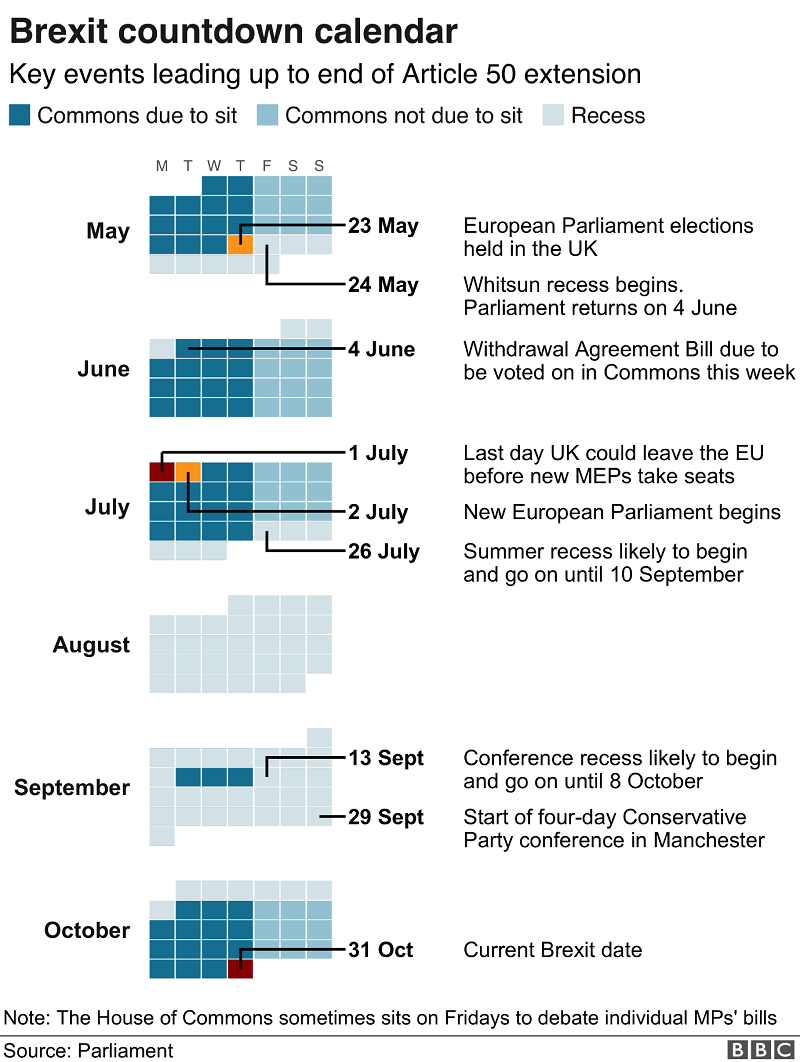Brexit Brief Newsletter
May 2019

This month's issue includes details of the Government's work on common policy frameworks post Brexit; the Alternative Arrangements Commission and the latest Brexit deal proposed by Theresa May.
GOVERNMENT PUBLISHES UPDATE ON COMMON FRAMEWORKS FOR DEVOLVED POWERS
When the UK leaves the EU, powers previously exercised at EU level which intersect with devolved competence will be exercised by the devolved regions. Common frameworks will be used to maintain UK wide approaches in policy areas where previously EU rules would have maintained consistency across the UK. The UK, Scottish and Welsh Governments and the Northern Ireland Civil Service have been working to agree the scope of where common frameworks are needed and where they might be implemented.
The Government has published a revised analysis of common frameworks with a revised breakdown of areas of EU law which with intersect with devolved competence in Northern Ireland, Scotland and Wales. This second iteration of the common framework revises the initial document published in March 2018.
The March 2018 report set out 153 areas where EU law intersected with devolved competence, including 24 areas where legislation may be needed in whole or in part; 82 areas where non-legislative frameworks may be required; and 49 areas where no further action was identified.
In this revised analysis there is an increase in the number of policy areas within the analysis from 153 to 160; a reduction from 24 to 21 in the category where legislation may be required in whole or in part; a reduction in the number of areas where non-legislative arrangements are being considered from 82 to 78 and an increase in the number of areas where no further action is required to create a common framework from 49 to 63. There are now four policy areas that the UK Government believes are reserved but remain subject to ongoing discussion with the devolved administrations – product safety and standards relating to explosive atmospheres; state aid; Food Geographical Indications (protected food names); and data sharing using the EURODAC database.
The document states that “primary legislation is only likely to be required in a small number of policy areas and in these areas only some elements of the framework will be implemented in primary legislation. In some instances, this will be accompanied by substantive non-legislative arrangements articulating agreed ways of working between the administrations. In the majority of areas, non-legislative arrangements, such as a concordat, are being considered and it is envisaged that the fixes to EU law, being put in place under the EU (Withdrawal) Act, may provide the basis for interim or longer-term framework arrangements, depending on the outcome of negotiations with the EU“
The document sets out some examples to illustrate what future arrangements could be put in place in a range of policy areas. The arrangements are still subject to discussion.
FISHERIES MANAGEMENT AND SUPPORT
Current proposals state that, where necessary, parts of the existing EU framework could be replaced by a UK framework. This would comprise a limited set of legislative provisions, partially established in the Fisheries Bill, supplemented by a concordat that includes ways of working, dispute resolution and enforcement processes. This will ensure common control and compliance standards, preserve equal access for UK vessels throughout the UK waters and require a joint statement on fisheries management.
The Government has also published its third update report on the European Union (Withdrawal) Act 2018 and Common Frameworks to cover the period 26 December 2018 to 25 March 2019.
The report details the steps the Government is taking with the devolved administrations, to establish common frameworks and any use of the powers in Section 12 of the European Union (Withdrawal) Act 2018 to temporarily freeze devolved competence.
The report says “It is important that the process of developing common frameworks is not just carried out between governments. We welcome the input and scrutiny from businesses and stakeholders as well as Parliament and the devolved legislatures as we move closer to implementation. With the devolved administrations, we are developing a wider programme of stakeholder engagement, to ensure that proposals for future frameworks meet the needs of those who will be impacted by them. The Northern Ireland Civil Service will continue to participate in this area of work”
The Government confirms that on the basis of the joint progress made, it does not need to introduce any Section 12 powers at this stage.
The update report states that within the 26 December 2018 to 25 March 2019 reporting period, where possible policy teams have continued to develop “outline agreements” in the 24 priority areas where frameworks are likely to require legislative elements, in whole or in part, at this time. In addition, “outline agreements” have been developed in a few areas where frameworks are likely to be primarily non-legislative.
BRITISH-IRISH INTERGOVERNMENTAL CONFERENCE
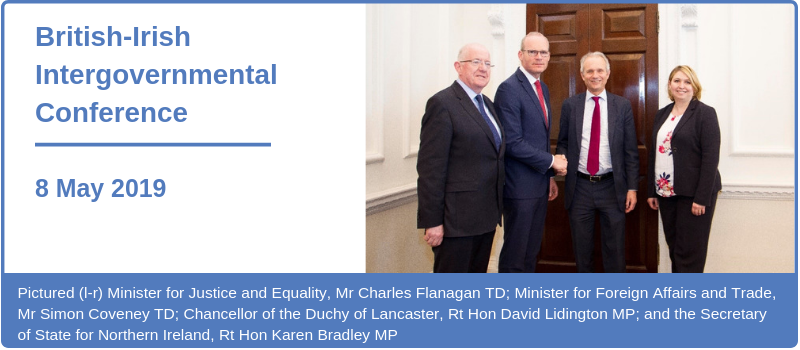
The British and Irish Governments signed a memorandum of understanding on the rights of Irish people in the UK and British citizens in Ireland. The deal was signed by David Lidington, Cabinet Office minister and Tánaiste Simon Coveney before the meeting of the British-Irish Intergovernmental Conference on 8 May 2019. The MoU clarifies the rights of citizens under the Common Travel Area.
It’s estimated that there are around 300,000 Britons living in Ireland and about 350,000 Irish people in the UK. Irish people and British people enjoy more reciprocal rights in the respective countries that other EU citizens because of the historical links between the two countries, for example Irish citizens can vote in UK elections and vice versa.
The British-Irish intergovernmental conference issued a joint communiqué detailing discussions on East-West Matters; economic co-operation; security co-operation; legacy; rights and citizenship matters; and political stability. Both sides agreed that the Conference would meet again in the coming months.
ALTERNATIVE ARRANGEMENTS COMMISSION LAUNCHED
On 30th April, Prosperity UK launched its 'Alternative Arrangements Commission' which "seeks to develop credible and practical Alternative Arrangements relating to the Irish Border that can be delivered in a timely fashion to ensure that the UK retains full flexibility in its future negotiations with the European Union".
Prosperity UK describes itself as 'a politically independent, not-for-profit platform bringing together business leaders, academics and policy-makers to seek solutions to Brexit issues and to look constructively at a future outside the EU and at how the UK can build an open, dynamic and balanced economy which maximises prosperity for all'.
The new Commission will be chaired by Treasury select committee chair, Rt Hon Nicky Morgan MP and former trade minister, Rt Hon Greg Hands MP. The Commission will be cross-party and will include representatives from across the political spectrum. The Commission will report in June 2019.
The press release announcing the launch of the Commission says "The Commission is seeking solutions that are both realistic and sustainable and recognises that their formulation and implementation will require the engagement of many stakeholders in the UK, Ireland and Europe.
Key to the proposals will be a commitment to protecting the Good Friday/Belfast Agreement. From a political perspective, the Commission's aim is to build upon Sir Graham Brady's Amendment, which sought to pass the WA, by replacing the Backstop with Alternative Arrangements. The Brady Amendment is the only Brexit proposal to have passed the House of Commons. ....
The Commission has engaged a Technical Panel comprising border and customs experts, practitioners and lawyers with detailed knowledge of trade, business and community relationships in Ireland as well as the EU, UK and international trade regulations in order to create draft processes and procedures to fulfil these goals. In addition, the Commission will engage with established technology providers in order to develop a comprehensive set of solutions and timelines for review.
Nine working groups have been created covering topics including the border and the movement of people in the context of the Good Friday Agreement, Tax, Sanitary and Phytosanitary standards, Small Traders and Trusted Trader Schemes. "
Members of the Commission include Rt Hon Nigel Dodds MP, Rt Hon Arlene Foster MLA, Emma Little Pengelly MP and Lord Trimble
MURRISON APPOINTED TO MINISTERIAL POST AT FOREIGN AND COMMONWEALTH OFFICE
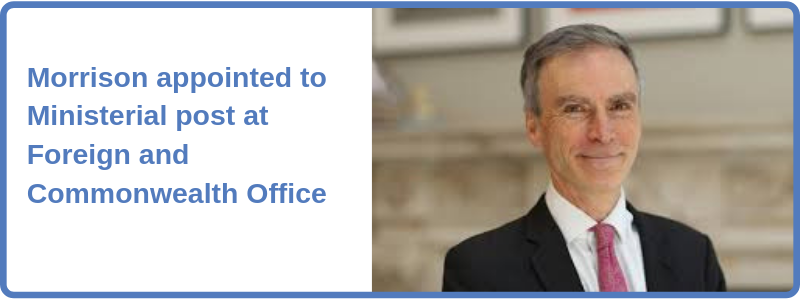
Dr Andrew Murrison, former Chair of the House of Commons Northern Ireland Affairs Committee (2017 – 2019) and former Northern Ireland Office Minister (2014-20150 has been appointed as Minister of State for the Middle East at the Foreign & Commonwealth Office and Minister of State for International Development.
There will be an election for the position of Chair of the Northern Ireland Affairs Committee which must be filled by a Conservative backbencher and nominations can be made until 10 June 2019. In the absence of an elected Chair, the Committee has agreed that Kate Hoey MP will act as the interim Chair.
JOINT MINISTERIAL COMMITTEE (EUROPEAN NEGOTIATIONS) MEETING
The Joint Ministerial Committee (European Negotiations) held its seventeenth meeting on 9 May 2019 in London. The meeting was Chaired by Rt Hon David Lidington MP, Chancellor of the Duchy of Lancaster and Minister for the Cabinet Office.
The Chair and the Parliamentary Under Secretary of State at the Department for Exiting the European Union Robin Walker MP provided an update on the UK’s exit from the EU, including a discussion on recent developments and the Committee discussed the role of the devolved administrations in the next phase.
The Committee also discussed domestic issues, including an update on common frameworks following publication of the revised Common Frameworks Analysis.
BREXIT SECRETARY AT LORDS EU COMMITTEE
On 15 May, Secretary of State for Exiting the European Union Steve Barclay gave evidence to the House of Lords EU Committee on the progress of Brexit negotiations.
On the withdrawal agreement and the Commons votes:
Stephen Barclay: “If the House of Commons does not approve the WAB (Withdrawal Agreement Bill), the Barnier deal is dead in that form. The House will then have to address the much more fundamental question as to whether it will pursue and communicate a no‑deal option or whether it will revoke. What has characterised the discussion on this has been unwillingness within the House of Commons to make a final decision between a deal, no deal or revocation. Those are the three options. The Prime Minister has said it many times. The House has given a view on the Prime Minister’s deal, in voting on it three times. That is why we have sought, in a Parliament where the Government do not have a clear majority, to explore options with the Opposition.
We had this discussion last time. If you look at the detail and the actual text of the withdrawal agreement from an opposition point of view there is a question. Is it the legal obligations? No. Is it citizen’s rights? No. Is it safeguarding no hard border in Northern Ireland? No. That did not stop a vote against the withdrawal agreement. Part of that was the lack of clarity on the political declaration, which relates to the attempts to seek further detail on that. Ultimately, if the House is not willing to back a deal, we need to confront the decision, no deal or revocation, and accept the consequences of that.”
On the border and Brexit:
Baroness Armstrong of Hill Top: “Northern Ireland remains part of the withdrawal agreement. Do the Government have any update for us on how that is going? David Lidington told the House at the end of April that the Government were investing £20 million in alternative proposals. It was said at another stage that we were at least 10 years from actual further proposals. This remains a major issue. Where are we on this?
Stephen Barclay: A number of issues arise from consideration of that. First, a very important consideration is whether the talks between the parties in Northern Ireland, at Stormont, deliver a successful outcome. Those are extremely sensitive talks but extremely important. That shapes much of the discussion there.
On the specific issue of alternative arrangements, you are right: The Government have a commitment to invest £20 million. We are proceeding with three working groups, one on parliamentary engagement, one that will be a technical group and one that will be a business group. They will all be chaired by Ministers and we are moving forward with that.
A number of issues flow from the alternative arrangements work. To what extent is there existing technology that is deployable? To what extent is there technology that is deployable but the unique circumstances of the border in Northern Ireland make that difficult? You could say that there is GPS tracking technology that could assist, but there may be security issues or community tensions from that, so one has to look at the technology and the community engagement. One has to look at the compliance costs. One has to look at the segmentation, not just on sectors but also between, say, small traders, multinationals, trusted trader schemes and so forth. One has to look at the extent to which the issue is about the Good Friday agreement and the extent to which it is really about the single market and protecting that. What is the real driver of the debate?
There are a range of issues. You then have the timescale for that. To what extent is it linked into the political debate on the protocol in Northern Ireland, and to what extent is it linked into, as Baroness Falkner correctly alluded to, the date at December 2020? Within the alternative arrangements, there are a whole range of different issues. We have made clear our commitment to exploring that at pace and we have committed money to doing so.
One final point on that is that the EU itself has accepted that there is merit in alternative arrangements. It has also made a commitment to joint working on alternative arrangements, but the key there is that that is post-ratification. On the government side, we have started and work is already under way on that. In terms of the joint working with the EU, that is a post-ratification issue. “
On working with the Irish Government:
The Chairman: “… what participation is there by the Republic of Ireland in the various working groups that you are talking about? Borders have two sides.
Stephen Barclay: The two main routes, within Her Majesty’s Government, are, first, through the Secretary of State for Northern Ireland, who, as you would expect, has very regular engagement with senior Ministers in the Republic of Ireland, and, secondly, the Chancellor of the Duchy of Lancaster, who has considerable engagement with Simon Coveney and others there. The Prime Minister, as you know, also has significant engagement with the Taoiseach, at Head of Government level, so there is quite an extensive engagement.
The Chairman: Are they involved in actual working groups, or are those just purely UK side?
Stephen Barclay: The working groups are UK. As I referred to in my earlier answer, the engagement with the Commission has been as an agreement post-ratification, so it has not been done on a bilateral basis. There will be a desire to engage with them. As part of the discussion, once we get into the meat of that work, that will be one of the questions we are very keen to surface and to see what appetite there is from the Irish Government, in their relationship with the Commission, what can be done and what they are not willing to do.”
STATEMENT FROM 1922 COMMITTEE ON PRIME MINISTER’S TENURE
The 1922 Committee which represents Conservative Party backbench MPs, met with the Prime Minister on 16 May 2019. Following the meeting, Sir Graham Brady, chairman of the 1922 Committee issued a press release which had been agreed with the Prime Minister. Under the terms of the deal, Theresa May will try to get the Brexit deal approved by Parliament in June and following that vote the Prime Minister and Sir Graham will meet to agree the details of the election of a new Tory Party leader.
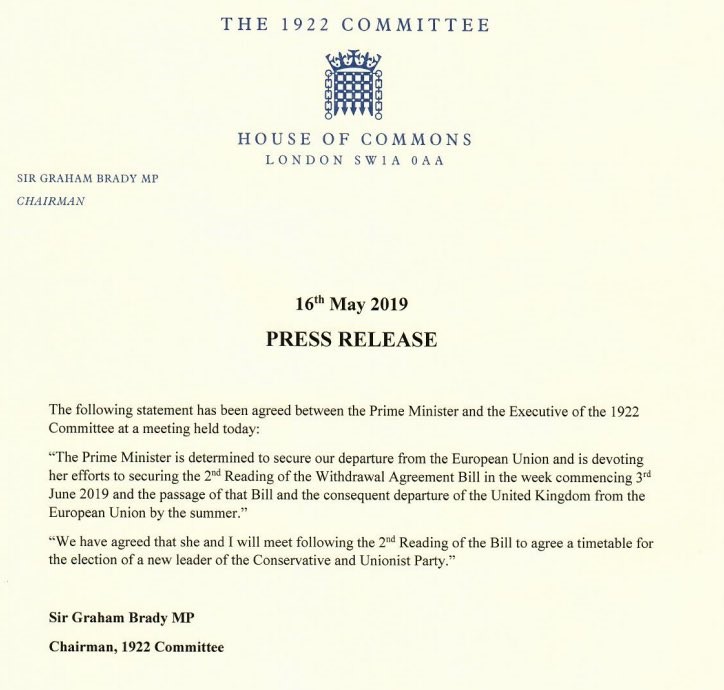
CROSS PARTY BREXIT TALKS BREAK DOWN
On 17 May six weeks of talks between the Labour and Conservative party aimed at agreeing a way forward on Brexit ended without a deal. Labour leader Jeremy Corbyn issued an open letter to Theresa May:
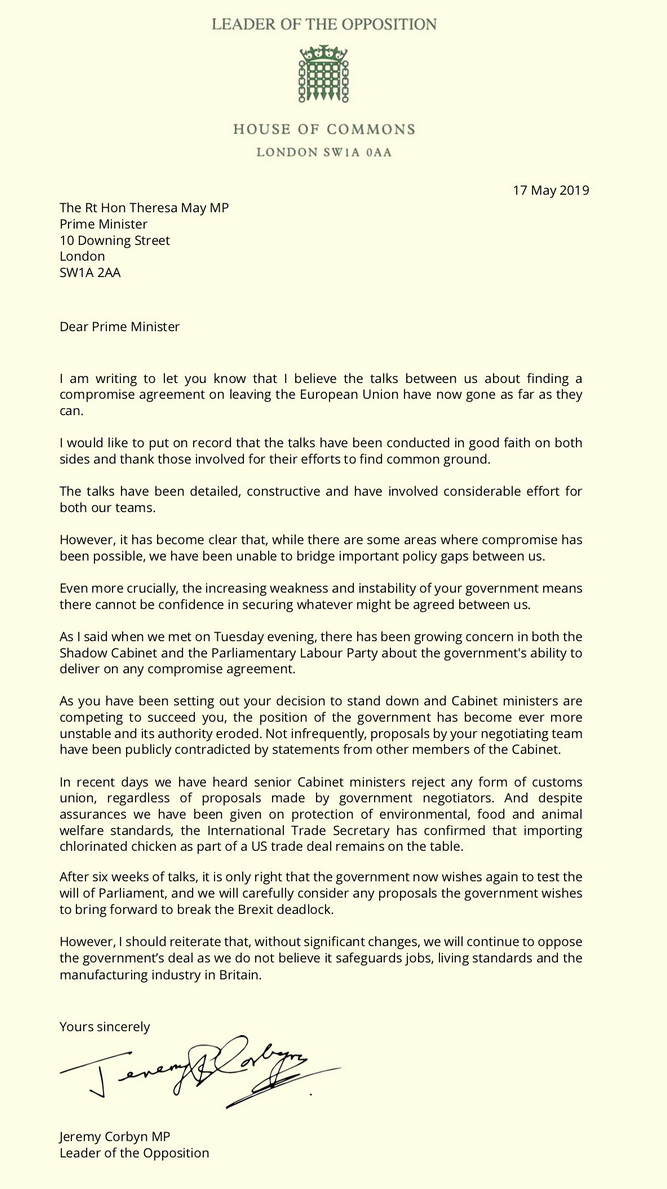
Speaking following the news of the breakdown of the talks, a number of media outlets reported on a leaked government document which reputedly outlined a proposal to hold indicative votes on Brexit options in the week beginning 20 May. The document suggested that Government Ministers had been discussing with the Labour party a plan to hold indicative votes with a view to getting MPs to consent to the sort of compromises that would then be included in the Withdrawal Agreement Bill, which will have its second reading in early June.
The votes would include one a 2nd referendum then a series of votes on Customs Union options decided by "preferential votes" - designed to force MPs to pick something.
Speaking on 17 May, Theresa May said “There have been areas where we have been able to find common ground but other issues have proved to be more difficult. And in particular we haven’t been able to overcome the fact that there isn’t a common position in Labour about whether they want to delivery Brexit or hold a second referendum which could reverse it. So when we come to bring the legislation forward we will think carefully about the outcome of these talks. We will also consider whether we have some votes to see if the ideas which have come through can command a majority in the House of Commons but when MPs come to vote on the Bill, they will be faced with a stark choice- that is to vote to deliver on the referendum, to vote to deliver Brexit, or to shy away again from delivering Brexit with all the uncertainty that that would leave.
Also speaking on 17 May Labour leader Jeremy Corbyn said “I don’t think it’s credible to say we get all the parliamentary agreement, all stages of a very controversial, major bill through parliament by the end of July, so, no, we wouldn’t support that.”
Commenting on the issue of potential indicative votes as outlined above, he said the Government had only raised its plan for indicative votes with Labour that week and that it had not given much detail about what it was planning. He said, if there were indicative votes, Labour MPs would be expected to vote in line with party policy, implying he would not allow a free vote on all items.
Speaking at the Downing Street press briefing on 17 May, the Prime Minister’s spokesman said “We have made real progress on some issues, such as workers’ rights and environment protections, but it is clear we are not going to be able to reach a complete agreement. In particular, there have been very challenging discussions in respect of the different positions of the two sides on customs and the holding of a referendum.
The prime minister continues to believe it is the duty of elected politicians to find a way to deliver on the results of the referendum. She continues to work hard on securing the passage of the withdrawal agreement bill so that the UK can leave the EU with a deal as soon as possible.”
GOVERNMENT MINISTERS VISIT NORTHERN IRELAND
International Trade Secretary Dr Liam Fox visited Northern Ireland on 16 May 2019 when the Board of Trade met in Northern Ireland for the first time. Six local companies were presented with Board of Trade Awards (BOFTAs) for their exceptional performance in international trade and three new advisers appointed to the Board of Trade.
Speaking on the issue of the backstop, Dr Fox said “That's what the European Union have agreed with us…. The question is how that gets applied and how we avoid having to get to that point”
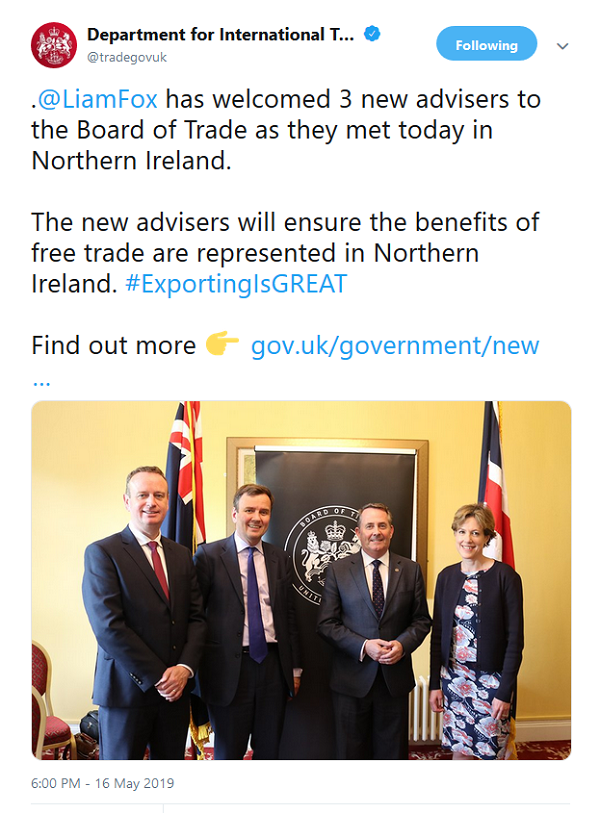
On 17 May, David Lidington, Minister for the Cabinet Office, visited Northern Ireland and his visit included meetings at Belfast Met, Cooperation Ireland, Giant’s Causeway and a trip Portrush to see the preparations for the Open in July. Speaking on the Prime Minister’s plan to bring the Withdrawal Agreement Bill to the House in early June, Mr Lidington said "MPs need to accept their second of third preference to find the right compromise to get a deal through and we can start delivering on the vote."
Brexit Secretary Steve Barclay visited Northern Ireland on 17 May including speaking to the Federation of Small Businesses at the Balmoral Show and a trip to Quinn Cement in Cavan.
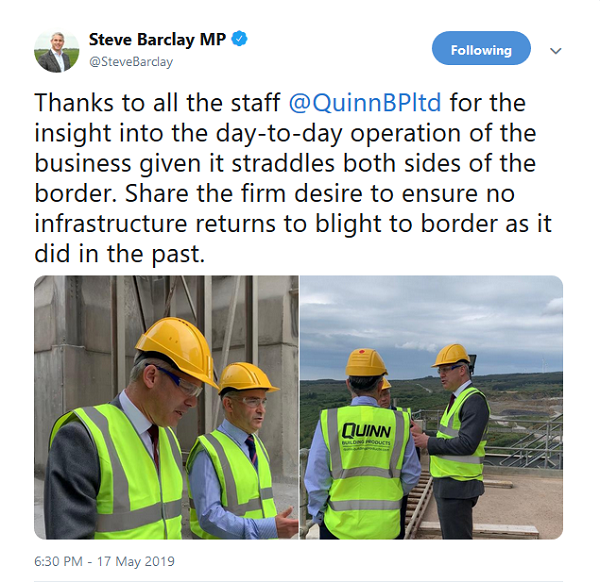
PRIME MINISTER’S SPEECH ON HER BREXIT DEAL
On 21 May, the Cabinet met to discuss the Prime Minister’s proposals to move forward with her Brexit plan. Following the meeting, the Prime Minister gave a speech.
“I have listened to concerns from across the political spectrum. I have done all I can to address them. And today I am making a serious offer to MPs across Parliament.
A new Brexit deal.”
With reference to the backstop, Mrs May said “I have also listened to Unionist concerns about the backstop. So the new Brexit deal goes further to address these.
It will commit that, should the backstop come into force, the Government will ensure that Great Britain will stay aligned with Northern Ireland.
We will prohibit the proposal that a future Government could split Northern Ireland off from the UK’s customs territory.
And we will deliver on our commitments to Northern Ireland in the December 2017 Joint Report in full. We will implement paragraph 50 of the Joint Report in law.
The Northern Ireland Assembly and Executive will have to give their consent on a cross-community basis for new regulations which are added to the backstop.
And we will work with our Confidence and Supply Partners on how these commitments should be entrenched in law.
This new Brexit deal contains significant further changes to protect the economic and constitutional integrity of the United Kingdom and deliver Brexit. It is a bespoke solution that answers the unique concerns of all parts of the community in Northern Ireland.”
On 22 May, the Prime Minister made a speech in the House of Commons on her plan. She outlined the “10 point offer to Members across the House”
- Protection of British jobs by seeking as close to frictionless trade in goods with the EU as possible while outside the single market and ending free movement. The government will be placed under a legal duty to negotiate the future relationship on this basis.
- Providing certainty for manufacturing and agricultural sectors by keeping up to date with EU rules for goods and agri-food products that are relevant to checks at the border. Such a commitment – which will also be enshrined in legislation – will help protect thousands of skilled jobs that depend on just-in-time supply chains.
- Empowering Parliament to break the deadlock over future customs arrangements by committing in law to let Parliament decide this issue, and to reflect the outcome of this process in legislation.
- Publication of a new Workers’ Rights Bill. If passed by Parliament, this Bill will guarantee that the rights enjoyed by British workers can be no less favourable than those of their counterparts in the EU – both now and in the future. Discussion of further amendments with trade unions and business.
- Guarantee there will be no change in the level of environmental protection when the UK leaves the EU and establishment of a new and wholly independent Office of Environmental Protection, able to uphold standards and enforce compliance.
- The Withdrawal Agreement Bill will place a legal duty on government to seek changes to the political declaration that will be needed to reflect this new deal
- Government will include in the Withdrawal Agreement Bill at introduction a requirement to vote on whether to hold a second referendum. If this House votes for a referendum, it would require the Government to make provisions for such a referendum – including legislation if it wanted to ratify the Withdrawal Agreement.
- Parliament will be guaranteed a much greater role in the second part of the Brexit process: the negotiations over the future relationship with the EU. The new Brexit deal will set out in law that the House of Commons will approve the UK’s objectives for the negotiations. And MPs will also be asked to approve the treaty governing that relationship before the Government signs it.
- The Brexit deal will legally oblige the government to seek to conclude the Alternative Arrangements process by December 2020, avoiding any need for the Northern Ireland backstop coming into force. And while it is not possible to use Alternative Arrangements to replace the backstop in the Withdrawal Agreement, we will ensure they are a viable alternative.
- Ensuring that, should the backstop come into force, Great Britain will stay aligned with Northern Ireland. Government will prohibit the proposal that a future Government could split Northern Ireland off from the UK’s customs territory and Government will deliver on the commitments to Northern Ireland in the December 2017 Joint Report in full. Government will implement paragraph 50 of the Joint Report in law.
The Northern Ireland Assembly and Executive will have to give their consent on a cross-community basis for new regulations which are added to the backstop.
The Government will work with its Confidence and Supply Partners on how these commitments should be entrenched in law, so that Northern Ireland cannot be separated from the United Kingdom.
LEADER OF THE HOUSE OF COMMONS RESIGNS
On 22 May, Leader of the House of Commons Andrea Leadsom MP announced her resignation from the Government. Her resignation was the 36th by a minister under Theresa May - 21 of them over Brexit.
In her letter to the Prime Minister, Mrs Leadsom said that “I do not believe our approach will deliver on the referendum result…. I do not believe that we will be a truly sovereign United Kingdom through the deal that is now proposed".
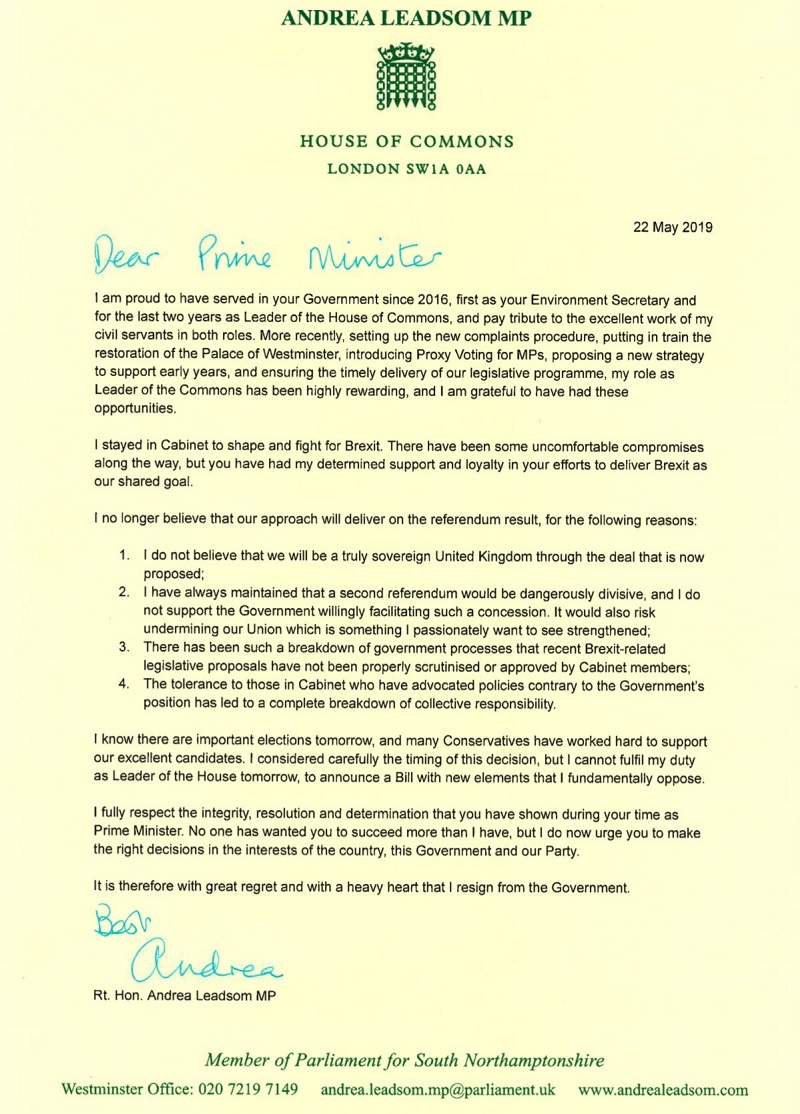
WITHDRAWAL AGREEMENT BILL
In her speech to the House on 22 May, the Prime Minister said
“Following the end of EU election purdah, the Withdrawal Agreement Bill will be published on Friday so the House has the maximum possible time to study its detail.
If Parliament passes the Bill before the summer recess, the UK will leave the EU by the end of July”.
Speaking at House of Commons Business Questions on 23 May, Mark Spencer MP told the House that the Withdrawal Agreement Bill will be published in the week beginning 3 June and that the Government hopes to have the second reading of the Bill on Friday 7 June 2019. The Bill, which will implement the Withdrawal Agreement into law, will contain the elements announced by the Prime Minister in her speech on 21 May, i.e.
- A guarantee of a Commons vote on whether to hold another referendum on the government's Brexit deal
- A vote on different customs options, including a government proposal for a temporary customs union for goods - what Mrs May called a "customs compromise"
- A legal obligation for the UK to "seek to conclude alternative arrangements" to replace the Northern Ireland backstop by the end of 2020
- If the backstop does come into force, the bill would guarantee Northern Ireland remains aligned with the rest of the UK and remains in same customs territory
- Legislation to ensure workers’ rights are "every bit as good, if not better" after Brexit - and guarantees of no dilution in environmental standards
- A legal duty to seek changes to the political declaration on future relations with the EU
THERESA MAY ANNOUNCES HER RESIGNATION
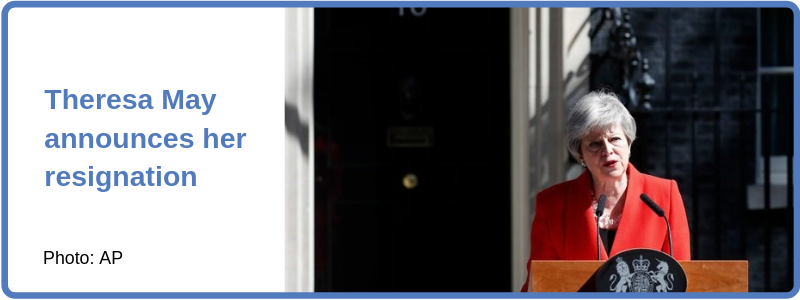
Speaking outside Number 10 Downing Street on 24 May 2019, Theresa May announced that she will step down as leader of the Tory party and Prime Minister on Friday 7 June with the campaign to select her successor beginning the following week. Her announcement came after a meeting with Sir Graham Brady, Chair of the 1922 Committee of Conservative backbencher.
Sir Graham issued a statement on the timetable for selection of the new leader “…. the parliamentary stages of the contest – which involves determining the final choice of candidates to put before all members of the party – should begin with the close of nominations in the week commencing 10 June. Successive rounds of voting will take place until a final choice of candidates to put to a vote of all party members is determined. We expect that process to be concluded by the end of June, allowing for a series of hustings around the UK for members to meet and question the candidates, then cast their votes in time for the result to be announced before Parliament rises for the summer. “
He also confirmed that he is cconsidering standing to be PM so has stood down as chair of the 1922 backbench committee
Reacting to Theresa May’s announced, Taoiseach Leo Varadkar said "We may see the election of a Eurosceptic prime minister who wants to repudiate the withdrawal agreement and go for no-deal, or we may even see a new British government that wants a closer relationship with the EU and goes for a second referendum"
We are going to build and strengthen our alliances across the European Union and we will make sure that we see Ireland through this"
EUROPEAN PARLIAMENT ELECTIONS
The European Parliamentary elections were held in the UK on 23 May. The elections took place across the 28 EU Member States 23-26 May. Almost 374 million people were eligible to vote for the 751 Members of the European Parliament (MEPs).
The UK has 73 seats in the European Parliament. Turnout was 17,199,701 (36%). Northern Ireland elected 3 MEPs – Diane Dodds of the Democratic Unionist Party, Naomi Long of the Alliance Party and Martina Anderson of Sinn Féin.
In GB, the Brexit Party won the most seats, winning 29 followed by the Liberal Democrats with 16. The Conservative and Labour parties both lost seats.
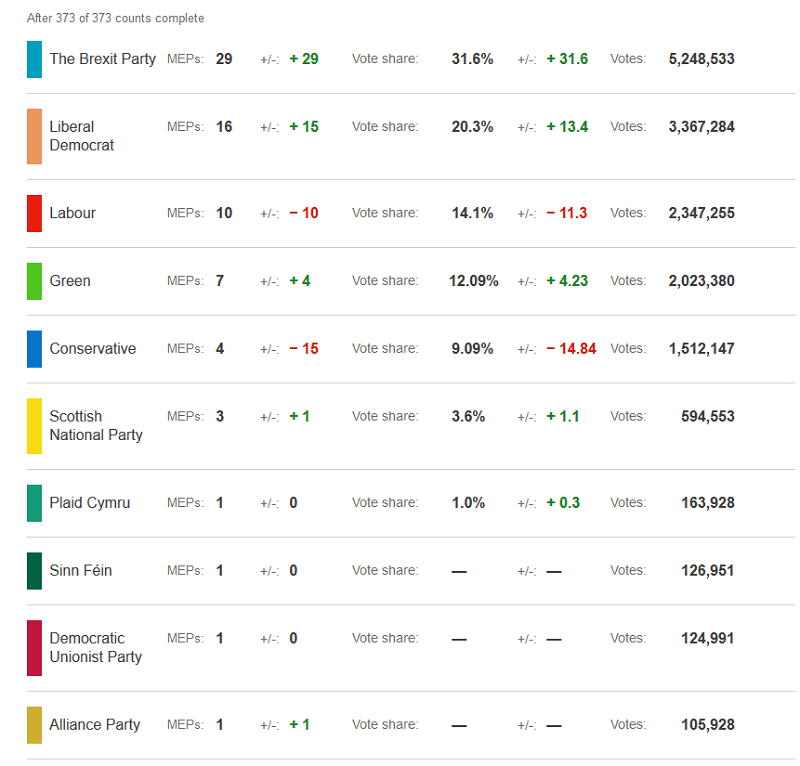
Source: BBC
Change compared with 2014. Vote share figures do not include Northern Ireland as it has a separate electoral system to the rest of the UK. Vote totals for Northern Ireland are first preferences only. For parties running in both Northern Ireland and Great Britain, the vote share is just for England, Scotland and Wales, but the vote total is the sum of all GB votes plus the first preference votes in Northern Ireland.
MEPs from across the Member States generally sit in transnational political groupings in the European Parliament, of which there are currently 8. The two largest groups – the centre-right European People’s Party and the centre-left Socialists and Democrats – remain the largest groups but have lost seats overall in this election.
For the Northern Ireland MEPs, Diane Dodds (DUP) is non-attached (i.e. doesn’t sit with any political group); Naomi Long (Alliance) will sit with the Alliance of European Liberals and Democrats (ALDE) group; and Martina Anderson (Sinn Féin) will sit with the Confederal Group of the European United Left/Nordic Green Left (GUE/NGL) group.
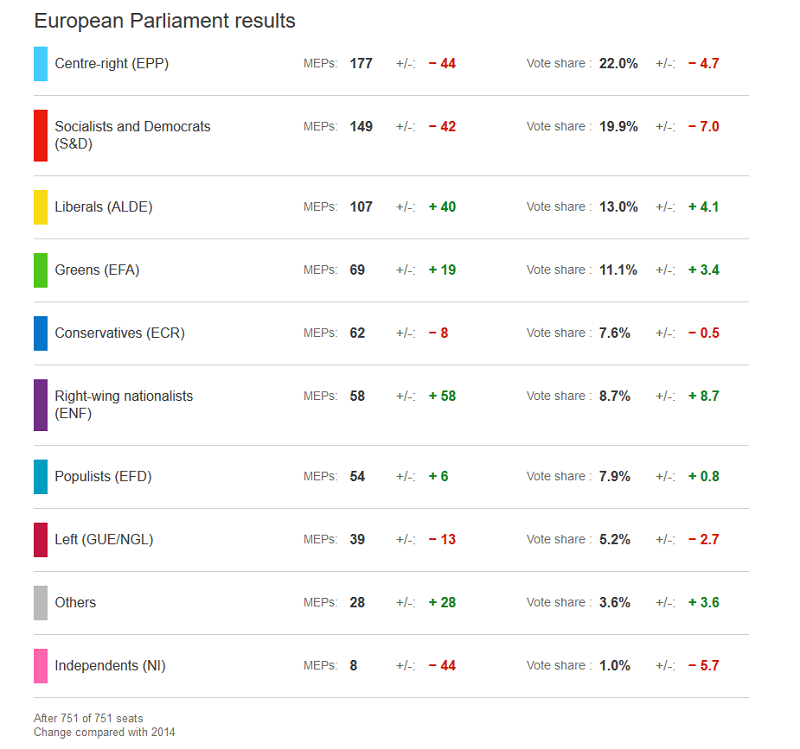
Source BBC
The results for individual countries are a mixture of projected and official figures, and are subject to change as more results are declared (correct as at 28/05/2019). Parties may also change which European party group they belong to.
The UK MEPs might not take up their seats if the UK and the EU reach a withdrawal agreement prior to 2 July 2019 which is the start of the European Parliament session. The European Parliament has a role in ratification of any withdrawal agreement so if this happened prior to 2 July, the Parliament would hold an extraordinary meeting to ratify the deal.
BRITISH IRISH CHAMBER OF COMMERCE
The British Irish Chamber of Commerce has launched its priorities for the next European Parliament.
- Support for a comprehensive trade deal between the UK and the EU
- Advocating for an EU-wide Brexit Mitigation Fund
- Input into the review of the Trans-European Transport Network (TEN-T)
- Champion the EU’s global trade agenda
- Protect the interests of the Irish agri-food sector
- Make international research and innovation cooperation a key pillar for EU research policy
- Maximise full member status on the European Parliament’s Committee on Economic and Monetary Affairs
INQUIRY ON SCOTLAND’S RELATIONSHIP WITH THE EU AND REST OF THE WORLD
The Scottish Parliament’s Culture, Tourism, Europe and External Affairs Committee has launched an inquiry into Scotland’s relationship with the European Union and the rest of the world and has issued a call for evidence.
MSPs want to understand in the context of Brexit how the Scottish Government’s external affairs policy should evolve, where resources should be allocated to meet strategic priorities and what lessons might be learnt from other countries.
The inquiry will look at the purpose and role of the Hub Offices which the Scottish Government has opened in Berlin, Brussels, Dublin, London and Paris.
Scotland’s engagement and influence with the rest of the world will also be another major theme of the inquiry. It will consider the Scottish Government’s current international engagement strategies and how appropriate they are. The inquiry will also question which countries Scotland should prioritise engagement with.
FOREIGN AFFAIRS COMMITTEE ROADSHOW, BELFAST
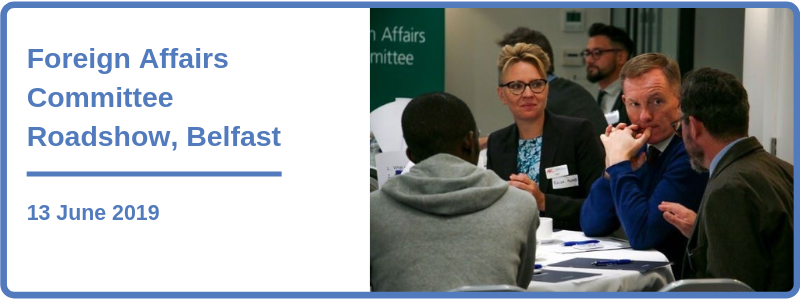
The House of Commons Foreign Affairs Committee will hold a meeting in Queen’s University Belfast on 13 June 2019. The Committee has been holding meetings around the UK to gather views on UK foreign policy and would like to hear from those interest in foreign policy; businesses that trade outside the UK; and charities that operate abroad. The Committee’s key questions are:
- Is the UK a key player on the world stage?
- What does Brexit mean for the UK’s place in the world?
- How should the UK engage in defence and development in the future?
- Should the UK intervene in humanitarian crises?
- Which international organisations should the UK be most active in?
The event is free to attend but places are limited and can be booked here.
BREXIT LEGISLATION
Of the 528 Statutory Instruments (SIs) laid by the Government before Parliament to prepare the statute book for exit day, 475 (90%) have completed their passage through Parliament.
The Government is introducing a suite of legislation to deal with Brexit. A summary of the status of some of this legislation is below. A full list of Bills before Parliament is available here
- Agriculture Bill – awaiting report stage in the House of Commons.
- Animal Welfare (Sentencing and recognition of sentience) Bill – not yet introduced. Consultation responses to draft Bill published August 2018
- Environment (Principles and Governance) Bill 2018 - draft clauses published 19 December 2018
- Financial Services (Implementation of Legislation) Bill (only required in the event of a no deal Brexit) – awaiting report stage in the House of Commons.
- Fisheries Bill – awaiting report stage in the House of Commons
- Immigration and Social Security Co-ordination (EU Withdrawal) Bill – awaiting report stage in the House of Commons
- Trade Bill - ‘Ping Pong’ stage (where Bill will go to the Commons for consideration of Lords amendments) is to be scheduled
- EU (Withdrawal Agreement) Bill – not yet introduced
Acts of Parliament (i.e. are now law)
- EU (Withdrawal) Act 2018
- Haulage Permits and Trailer Registration Act 2018
- Healthcare (European Economic Area and Switzerland Arrangements) Act 2019
- Nuclear Safeguards Act 2018
- Sanctions and Anti-Money Laundering Act 2018
- Taxation (Cross-border Trade) Act 2018
SO WHAT’S NEXT?

May 23 – June 4: House of Commons Whitsun recess
June 4-6: Introduction of Withdrawal Agreement Bill in week commencing 3 June
June 7? Second reading of the Withdrawal Agreement Bill (date tbc)
June 20-21: European Council meeting with review of progress of exit negotiations
End of June: Final list of candidates for Tory leadership to be determined
July 2: European Parliament’s first session of new term begins
Mid/end July: New leader of Conservative Party announced (date tbc)
Mid/end July: Parliamentary recessbegins (date tbc)
September 10? Beginning of new Parliamentary term (date tbc)
Mid Sept – early Oct: Recess for party conference session (dates tbc)
October 17-18: European Council meeting
October 31: UK leaves the EU (if the Withdrawal Agreement isn’t ratified before this date)
BREXIT CALENDAR
